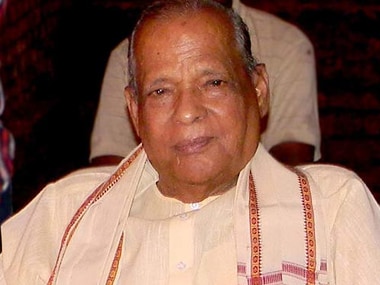By S N M Abdi “Does coming to my office and asking me whether I’m a homosexual give you a sense of power?” JB Patnaik, who died on Tuesday, once asked me. “Not at all”, I had frankly told Patnaik who was then Orissa’s all-powerful Congress Chief Minister, “but I do feel extremely grateful to Syed Ebadat Hussain.” “Who is he?” asked Patnaik, rolling his eyes in exasperation. “My grandfather who stayed back in India during Partition. If he had migrated to Karachi lock, stock and barrel in 1947, as many affluent Muslims in north India did, I would be living today in a country without democracy or a free press.” My 1986 cover story in the Illustrated Weekly of India, “The strange escapades of JB Patnaik”, was not about Patnaik being gay or straight. The report was based on sworn affidavits given to me by men and women accusing Patnaik of sexually exploiting them when they went to him for help. It was about the misuse of state authority. [caption id=“attachment_2209344” align=“alignleft” width=“380” class=” “]  Former chief minister of Odisha JB Patnaik. PTI[/caption] Before the piece was published, I interviewed Patnaik in his chamber in the state secretariat in Bhubaneswar where I told him about the gratitude I felt for my dad’s father who ensured that I was born and grew up in India entitling me to ask the high and mighty uncomfortable questions in the public interest. The expose and its aftermath are part of journalism school curriculum across India. I was barely 27 when I wrote that piece which is considered a milestone in investigative journalism not only because it pushed the frontiers of journalism but also because of the hard lessons it taught the profession. I felt both sadder and wiser from the experience of first writing what I still believe was true but which invited a Rs 1 crore defamation suit and led to me ultimately being a signatory to an unprecedented public apology Illustrated Weekly carried in August 1989 condemning its own story. But the clean chit Patnaik wangled didn’t serve its purpose – he badly lost the 1989 Odisha assembly elections and chief minister-ship which was so dear to him. Illustrated Weekly editor Pritish Nandy, and I, the magazine’s Special Correspondent in Calcutta in those days, fought the Rs 1 crore defamation suit Patnaik filed for three years with the full backing of Bennett, Coleman and Company, better known as The Times of India Group. But ultimately an apology was shoved down my throat and Pritish’s. Patnaik (using his clout) compelled Illustrated Weekly to publish an apology which, in former Statesman editor S Nihal Singh’s words, was “so demeaning that every journalist felt diminished”. What was most objectionable was acknowledging “a political motivation” behind the report when there was none. As the expose’s author I can vouch for that. Pritish displayed his anger at the turn of events and his full confidence in me by getting me to write the cover story, “A Mafia is Ruling Our Country”, in the Illustrated Weekly issue which carried the cringing apology. It was a message that we were unrepentant. The apology read: “We, Bennett, Coleman and Company Ltd, Pritish Nandy, editor of the Illustrated Weekly and SNM Abdi, special correspondent of the Illustrated Weekly, had published two articles under the captions ‘The strange escapades of JB Patnaik’ and ‘Why is JB Patnaik being allowed to gag the press?’ in the issues dated 18-24 May 1986 and 3-9 August 1986 respectively, based on information available to us. Subsequently, we found that the information, on the basis of which these articles were written, was not true and was politically motivated. We regret the damage done to Mr Patnaik’s reputation and offer our apologies to him.” Singh, the doyen of Indian journalism, wrote in India Today that “apart from the hurt caused to journalists’ self-esteem, this landmark apology raises portentous issues of press freedom and of the future of investigative journalism in India”. A lot of petitions and counter petitions were filed in various courts in Odisha, including the High Court, in connection with the defamation suit. But the surrender took place before the trial could start. The victims’ sworn affidavits and audio tapes, on which the expose was based, were never tested in court. Whether the evidence would have withstood the legal scrutiny is open to conjecture. Soon after the defamation suit was filed, I ran into Aveek Sarkar, Editor-in-Chief of the Ananda Bazar group. He was wearing a grey safari suit. I knew Aveek-babu as I had worked for Sunday magazine (now defunct), which he owned. Aveek-babu told me that affidavits and audio tapes wouldn’t work in court. He said my case would have been foolproof if I had photographs of Patnaik’s alleged escapades. In hindsight I feel that I should have refused to sign the apology and faced the consequences, including imprisonment, if push came to shove. But I was young and inexperienced and didn’t have good advisers. So I gave in when I shouldn’t have. My mother cried when Doordarshan telecast the apology.
SNM Abdi’s 1986 cover story in the Illustrated Weekly of India, “The strange escapades of JB Patnaik”, was not about Patnaik being gay or straight.
Advertisement
End of Article
Written by FP Archives
see more


)
)
)
)
)
)
)
)
)



